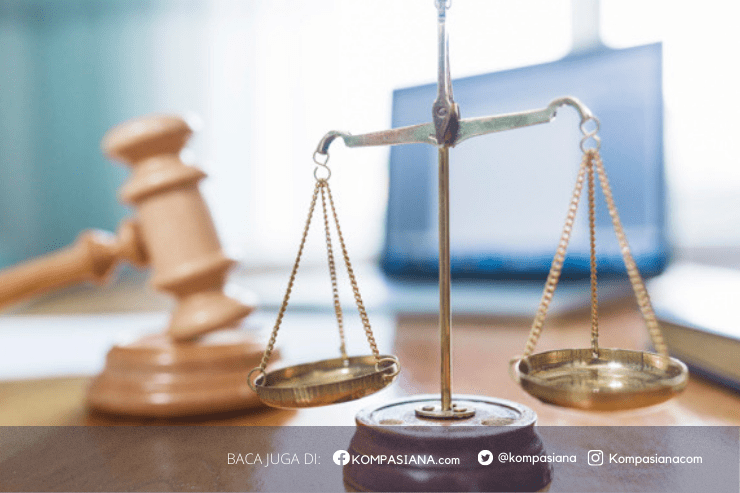A. RELATIONSHIP BETWEEN INTERNATIONAL LAW AND OTHER DICIPLINES
Constitutional law is a branch of legal science that studies the state, where the meaning related to constitutional law varies. Mahfud MD defines Constitutional Law as rules of conduct regarding the relationship between individuals and their country. while Jimly Asshidddiqie defines it as a branch of legal science that studies legal principles and norms that are stated in writing or that live in the reality of state practice with regard to:
1. constitution regarding the collective agreement of a community of people regarding the ideals of living together in a country;
2. institutions of state power and their functions;
3. the relationship mechanism between the institutions; And
4. the principle of the relationship between state power institutions and citizens.
the conclusion is that the meaning of constitutional law is a branch of legal science that studies the structure of organs and the state and the relationship between the state and its citizens. Talking about the state, in law there are many branches of legal science that study the state and have a relationship with the scientific branch of Constitutional Law, these relationships are as follows:
Relationship Between Constitutional Law and The General Theory Of State
The general theory of state is a science that studies the basic meanings and fundamental aspects of the state in general. The general theory of state as introduction for constitutional law .State science studies the state in an abstract and theoretical sense, in contrast to constitutional law which has a practical nature. as an example of carrying out decisions, state science does not look at how the law is implemented because state science is theoretical, different from law. state administration that can be used in practice because of its practical nature.
Relationship Between Constitutional Law and political Science
J.Barent defines that there is a relationship between political science and Constitutional Law, where constitutional law is interpreted as a human framework while political science is interpreted as the flesh that coats that framework. As stated previously, constitutional law regulates state organizations and state institutions, while the understanding of political science is oriented towards the formation and distribution of power. Constitutional law studies the legal regulations that regulate the organization of state power, on the other hand, political science studies the behavior of power. Legal products are political processes or political decisions because they are essentially prepared by political institutions, while constitutional law views laws as legal products formed by state apparatus which is given authority through procedures and procedures established by constitutional law. .
In this regard, the relationship between legal science and political science gave birth to a new field of study, namely legal politics. Legal politics discusses how a law is drafted and passed through a political process, so that laws are not only legal products but also political products, as previously stated, laws are a political product.
Relationship Between Constitutional Law and Administrative Law
According to Van Vollenhoven Administrative law studies all the rules of law that are technical in nature, in the sense that the state is in a state of motion. Where administrative law regulates the implementation of government in carrying out its duties. While constitutional law is fundamental, in the sense that the state is in a fixed state. Administrative law has similarities with constitutional law in terms of government policy, while in terms of differences, constitutional law refers to the use of the constitution used by the state in terms of regulating government policy. Administrative law also often called Constitutional Law in spesific scope.
B. SOURCE OF CONSTITUTIONAL LAW
One aspect of teaching law is about the sources of law. the source of law is how and where the place or origin of legal regulations is taken or used as a guide to the life of a country. According to E.Utrecht, there are two kinds of understanding of legal sources of legal sources in a formal sense and legal sources in a substantial, material sense. The source of law in the formal sense is the formal place in written form from which a legal method is taken, while the source of law in the material sense is the place where the norm comes from, either in written or unwritten form.
a. Source of Law in Formil Sense
The source of constitutional law in the formal sense is all written and unwritten legal regulations. The source of formal law is the place or source from which a regulation obtains legal force. Related to the form or method that causes formal legal regulations to apply. there are seven formal sources of Constitutional Law in indonesia as follows :
1. Constitution
According to Jimly Asshiddiqie, the constitution is the basic law, basic norms, and at the same time the highest position in the state system, divided into two, namely the constitution in the sense of written and unwritten constitution. The written constitution is the 1945 Constitution of the Republic of Indonesia, while the unwritten constitution is the constitution in a broad sense, which lives in legal consciousness and the idealized practice of state administration.
2. International Treaties
Treaties or agreements are one of the sources of formal law. Many terms are used in international agreements such as charter, covenant, pact, statute, convention, act, protovol and et cetera. International treaties can be bilateral, if held by two countries, multiteral, if held by many countries, collective, if a multilateral treaty provides an opportunity for countries that initially did not participate in holding it, then become parties to the treaty. According to Utrecht, the making of a treaty goes through four consecutive phases, namely: a) Determination; b) Approval; c) Ratification; d) Inauguration or announcement.
3. Jurisprudence
In the Indonesian legal system, not all court decisions can become or be considered jurisprudence, court decisions considered as jurisprudence must fulfill the following conditions: (1) it must be a decision that has permanent legal force; (2) it is considered good in the sense that it does produce justice for the parties concerned; (3) decisions that are repeated several times or carried out in the same pattern in several separate places; (4) the norms contained therein are indeed no applicable written regulations, or even if there are, they are not very clear; (5) the decision is considered to have met the requirements of jurisprudence and is recommended by an examination team or self-assessment team formed by the Supreme Court or Constitutional Court to become permanent jurisprudence.
Jurisprudence can be divided into two classifications, namely: First, jurisprudence (ordinary) where all court decisions that have been "inkracht van gewijsde", that is, have permanent legal force. Second, permanent jurisprudence (vaste jurisprudentie) is a judge's decision that is always followed by other judges in similar cases that take place continuously.
4. Doctrine
Doctrine is a statement or opinion of legal experts. In reality, many opinions of legal experts are widely followed by people and become the basis and consideration in determining the law, either by judges when deciding a case or by lawmakers. According to Jimly Asshiddiqie, doctrines or opinions of legal experts must meet the requirements, namely: (1) the scientist concerned is known and widely recognized as a scientist who has authority in his field and has integrity that can be trusted; (2) the issue concerned is not found in the applicable written regulations; (3) the legal opinion in question has been recognized for its superiority and is accepted by the public, especially accepted among fellow scientists.
5. Legislation
According to Ni'matul Huda, laws and regulations (also known as legislation) are written laws that are formed in certain ways by authorized officials and set forth in written form. Laws in the formal sense are regulations from the point of view of how they are formed, issued by the authorized state legislative body. Included in formal laws are the Constitution, the Book of Laws and the Law. In this case, the House of Representatives is authorized to form laws that are ratified by the President (Article 20 of the 1995 Constitution).
6. Customary law
Constitutional customary law is all the rules of customary law that regulate the structure of indigenous peoples, the forms of customary law societies (alliances), equipment (devices), the composition of positions and duties of each member of the equipment of indigenous alliances, customary density assemblies, and do not forget the property of indigenous community alliances. According to Usep Ranawidjaya, some of these constitutional customary laws emerged from ancient times and some emerged during independence.
7. Constitutional Convention
A constitutional convention is a term commonly used in discussions on matters of state practice and in the science of constitutional law. terminology commonly referred to in discussions on matters of constitutional practice and in the science of constitutional law. (Sometimes, the term convention is synonymous with custom or constitutional custom, even though it is actually different. habits or constitutional customs, when in fact they are different. Custom requires repetition, while convention does not. In practice, conventions are also considered as a way of change what is written in the text of the constitution, according to the needs to ensure the operation of constitutional norms in practice.Conventions are part of the rules of state administration (constitution) that grow, are followed and adhered to in the practice of state administration. Conventions as part of the constitution cannot be enforced by (through) the courts. Conventions are adhered to solely driven by ethical, moral or political demands in state administration. Conventions are provisions on how (otherwise) discretionary powers should be exercised.
b. Source of Law in materiil Sense
The source of material constitutional law is the source that determines the content of the rules of constitutional law. according to Jimly Asshiddiqie in Introduction to Constitutional Law, the source of material constitutional law is Pancasila. According to Jimly, the view of life of the Indonesian nation is reflected in the formulation of the precepts of Pancasila which is used as the philosophy of state life. As a source of material law, Pancasila must be implemented by and in every Indonesian legal regulation. as in article 2 of law number 2 of 2011 concerning the formation of laws and regulations which states that Pancasila is the source of all sources of state law. The placement of Pancasila as the source of all sources of state law must be in accordance with the preamble of the 1945 Constitution which places it as the basis of state idiology as well as the basic philosophy of the nation and state so that any content material of laws and regulations must not conflict with the values contained in Pancasila. The placement of Pancasila as a staatsfundamentalnorm in the form of basic state norms or the source of all sources of law, means placing Pancasila above the basic law. If so, Pancasila is not included in the definition of the constitution, because it is above the constitution.
Baca konten-konten menarik Kompasiana langsung dari smartphone kamu. Follow channel WhatsApp Kompasiana sekarang di sini: https://whatsapp.com/channel/0029VaYjYaL4Spk7WflFYJ2H







